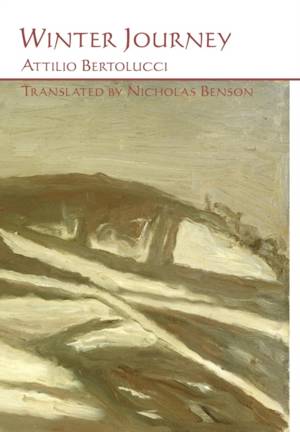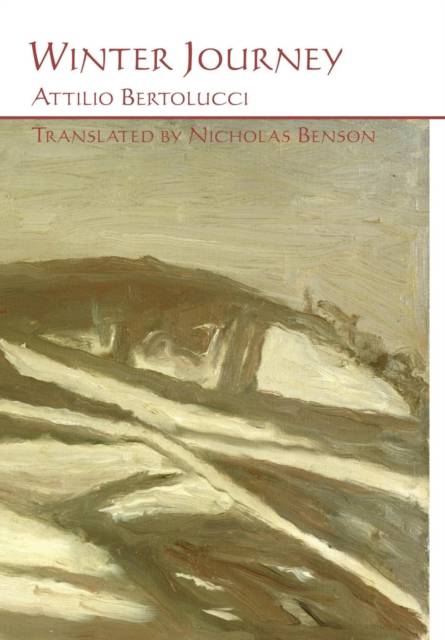
- Retrait gratuit dans votre magasin Club
- 7.000.000 titres dans notre catalogue
- Payer en toute sécurité
- Toujours un magasin près de chez vous
- Retrait gratuit dans votre magasin Club
- 7.000.0000 titres dans notre catalogue
- Payer en toute sécurité
- Toujours un magasin près de chez vous
Description
Translated here into English for the first time in its entirety by Nicholas Benson, Bertolucci's WINTER JOURNEY (Viaggio d'inverno, 1971) traces the author's nervous anxiety and the broader afflictions of an emergent consumer society at the Italian midcentury. Increasing social proximity illuminates a persistent isolation, relieved only-tenuously-by the bonds of family and friendship. In a country then recovering from the effects of nationalism, it is significant that a major poet would avoid the pitfalls of populism and paternalism, just as his writing avoids antagonism and aestheticism. Bertolucci's meditations on the effects of the Fascist ventennio can be read as a subtle critique of such divisions, which weakened resistance to the regime and enabled the country's later fragmentation. There are other precedents in Italian poetry for rejecting the florid rhetoric that seemed to overspill the nineteenth century; Bertolucci's enduring contribution may reside in his open examination of what remains possible if social and personal beliefs, typically connected to an idealized future or past, are extinguished in the voracious present of the inquiring self. About the Author ATTILIO BERTOLUCCI (Parma 1911 - Rome 2000), one of Italy's greatest twentieth-century poets, was also an influential editor, essayist, and translator. Among Bertolucci's many honors was the 1991 Eugenio Montale prize, considered the highest award in Italian poetry. About the Translator NICHOLAS BENSON holds a PhD in Italian from New York University. His poetry and translations have appeared in New England Review, Pequod, Seneca Review, and other journals. If WINTER JOURNEY is about Attilio Bertolucci's struggle to survive, it is also instructive; that rare thing: a poetic text that is both useful and beautiful. . . . Where Ungaretti and Montale and Pasolini and Pavese presented landscapes always fraught with extremity, both spiritual and material, Bertolucci offers a totality in which there is always work to be done and restoring the house is congruent with restoring the soul. The luminous, uncanny precision of Nicholas Benson's translations give Bertolucci's poetry a presentness that is altogether compelling. - Mark Rudman, author of RIDER (WINNER OF THE National Book Critics Circle Award in 1994) and, most recently, Sundays on the Phone Bertolucci's peculiar poetic genius is perhaps that of having brought to the surface the poetry hidden in that apparently most unpoetic subject, the "homme sensuel moyen" (and I use the word "subject" in both of its senses: as theme or object of poetry, and as a poetizing subject). The poem "Verso Casarola" seemed to me an apt symbol of all that: Bertolucci is able to describe as ultimately idyllic and tinged with eroticism the partial and property-assured displacement of a middle-class family against the background of one of the most tragic collective moments in Italian history (September 1943). The translator, Nicholas Benson, skillfully meets the challenge of rendering Bertolucci's peculiar Italian style. His translation is based on scholarly knowledge and, at the same time, animated by a poetic sensitivity. --Paolo Valesio, Giuseppe Ungaretti Professor in Italian Literature, Columbia University; founder and editor of Italian Poetry Review
Spécifications
Parties prenantes
- Auteur(s) :
- Traducteur(s):
- Editeur:
Contenu
- Nombre de pages :
- 240
- Langue:
- Anglais
- Collection :
Caractéristiques
- EAN:
- 9781932559095
- Date de parution :
- 17-11-04
- Format:
- Livre relié
- Format numérique:
- Ongenaaid / garenloos gebonden
- Dimensions :
- 152 mm x 229 mm
- Poids :
- 509 g

Les avis
Nous publions uniquement les avis qui respectent les conditions requises. Consultez nos conditions pour les avis.






